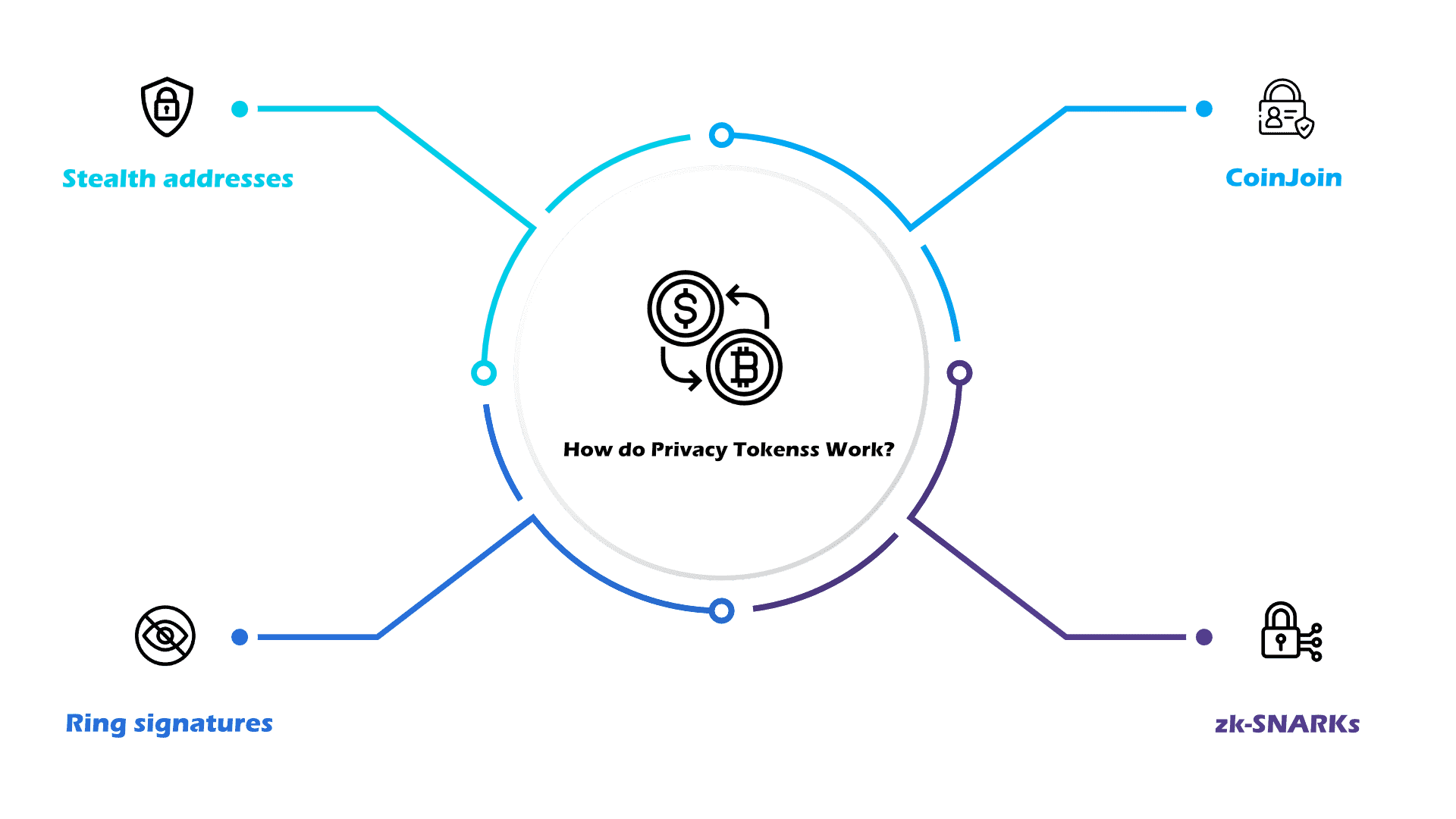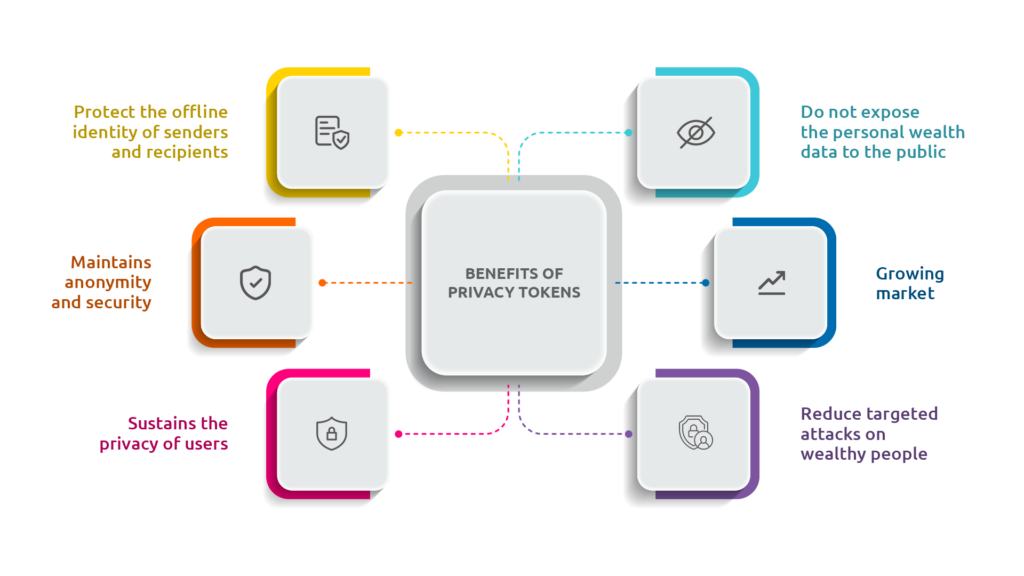

Generally, blockchain ledgers offer a level of anonymity in transactions. However, it is not foolproof. With advanced analytics and monitoring wallet transactions, it is possible to trace back wallet transactions to its user.
So does that mean you cannot launch a blockchain or dApp that offers 100% anonymity? No. You can, with Privacy tokens. In this article, we’ll learn in detail about privacy tokens and how it enables total anonymity for crypto transactions.
Dive in to explore more about Privacy tokens!
A direct answer would be that these tokens promote privacy and anonymity in blockchain transactions by masking the information related to the source and destination of the transaction. Two aspects of privacy tokens are anonymity and non-traceability. Thus, the identity and other details like account balance will be hidden, and transaction history cannot be traced by blockchain analysis technology. Taking away the privacy-preserving feature of the privacy token makes it similar to a bitcoin. You might be wondering, what is the whole point of it? In the first place, the concept of bitcoin came into existence in 2008 as an answer to the great financial crisis and to overcome the financial world’s overreliance on banks and banking intermediaries. The sense of excitement for this decentralized digital currency was due to the most attractive attribute of blockchain technology, which is the transparency of financial transactions.
So, the idea of protecting the privacy of blockchain transactions might be confusing to you. So how does blockchain technology prevent tracing? Let’s take a look into that.
Related article : What are Non-fungible tokens or NFTs?
Privacy tokens achieve the objective of anonymity and non-trackable transactions mainly through the following strategies. They often mix these tactics.

Related article: What Are Social Tokens and What Are Its Benefits?
It could be both a yes and a no. The legality of these tokens depends on the government of each country. Privacy-protected tokens are legal in some countries, while some countries like South Korea and Japan banned these tokens. Some experts press on the need to regulate privacy-protected tokens as it is an easy way for criminals to do untrackable transactions. Hence it is essential to deal with these tokens wisely, or else it is easy to use these tokens for malicious intentions.
Some exchanges also stopped privacy token transactions as a part of anti-money laundering policies. Examples of such rules include the FATF Travel Rule and the AMLD-5 directive brought in by the European Union.
But isn’t it intriguing that some giants like Elon Musk and Edward Snowden promote privacy-protected tokens and privacy apps? Countries worldwide have started to open up their financial and regulatory information systems to recognize cryptocurrencies as a valid monetary units for payments. Russia, Japan, and Australia are the latest additions to a growing list of nations that have started to accept digital cryptocurrencies as an authentic payment system.
Let us now dive into the benefits of privacy-protected tokens, and hence that gives us the proof of why these tokens are legal and will be legal in some countries soon.
If you plan to launch a privacy token, consult with a reliable blockchain development company to do a feasibility analysis on privacy tokens.
Related Article : Blockchain as a Service (BaaS): How to choose the right provider?
Here, let us summarize the significant advantages of privacy tokens:

Since the identity of the sender and receiver is kept anonymous during the transactions, hence, the protection of identity is assured.
This feature maintains anonymity throughout the transactions, preventing targeted advertisements based on previous transaction patterns. Hence we could see the security that arises from anonymity in transactions.
Businesses may have company secrets or a list of clients and stakeholders that they wish to keep secure. As a user, you should be concerned about your safety because hackers can easily find and target large holders
Transparency might seem attractive, but it comes with its own consequences. Exposing personal wealth data to the public is not always a safe choice. Thus relying on privacy-protected tokens would be an intelligent choice here.
The market of privacy-protected tokens has seen a rise lately despite having a bad reputation. This opens doors to the possibility of making a good fortune, and wise investors are already on it.
Targeted attacks on wealthy people result from revealing the transaction details to the public. Privacy token here serves as the undeniable solution.
Everything about a transparent transaction is an ideal case with its complications. Privacy is the inevitable component of social life, and the pressing need for privacy is yet to reflect in the cryptocurrency world. So, these benefits imply the promising future of privacy-protected tokens. As a result, it would be sensible for founders to launch these tokens to advance in the future.
Contact us for a no-obligation consultation
You’ve read a lot about privacy-protected tokens. So now, let’s get familiar with a few popular privacy coins available in the market.
Monero is one of the most popular anonymous cryptocurrencies. It promotes complete anonymity by employing an effective combination of privacy features such as RingCT, stealth addresses, and Ring signatures, protecting the identities of the sender and the receiver.
The easiest supporting statement to prove Monero’s exceptional privacy and security features are that United Nations IRS (Internal Revenue Service) has announced a reward of US$ 625000 for those who can crack the anonymity technology of Monero.
You’d need the Monero transaction ID, private transaction key (an automatically generated one-time key), and the recipient’s public address for Monero transactions.
Dash is another anonymous cryptocurrency that began as a Bitcoin fork in 2014. The first privacy coin was XCoin, later revised to DarkCoin, and Dash. PrivateSend, which uses the CoinJoin strategy to mask real transaction inputs, is one of Dash’s optional anonymity features.
Dash is not a natively anonymous coin as it is a fork of Bitcoin. Hence, the transaction details are hidden from the public blockchain only if the user decides to use the PrivateSend option. Dashpay’s CEO doesn’t think that Dash is about anonymity. It is all about usability and user protection, says DCG (Dash Core Group).
Another privacy coin has the same root as Dash. Zcash also is a fork of Bitcoin. ZEC) defines itself as “If Bitcoin is like HTTP for money, Zcash is HTTPS,” emphasizing its enhanced security and privacy aspects.
Launched in 2016, Zcash employs privacy and untraceability mechanisms called shielded transactions and zk-SNARKS and a cryptographic tool called Zero-Knowledge proof to hide the details of transactions. Here also, the user has the freedom to choose the option of hiding transaction details and maintaining anonymity.
BEAM is a privacy token based on the anonymity blockchain MimbleWimble. The technology improves the scalability of proof-of-work protocols by providing easily downloadable and verifiable compact data solutions that are convenient, apart from privacy. BEAM makes use of the Dandelion mechanism to hide the network traffic. A large number of small transactions are represented as a single large transaction.
Read more: What to know before implementing blockchain in your business
Millions of bitcoin transactions happen each day. Each of these transactions is recorded in the bitcoin blockchain and is accessible to anyone and everyone. Thus it does not protect your identity and transactions from snoopy eyes and government authorities. But what if you don’t want the world to know your identity, balance in your wallet, and transaction details? That’s where privacy-protected tokens come in handy. These tokens mask your identity allowing you to purchase whatever you want without telling the world about it. Hence, the exceptional features of anonymity and privacy open the door to a wide range of possibilities, giving privacy-protected tokens a promising future.
So we cant have this cold attitude towards privacy tokens forever due to the shady image of these coins, but rather promote to embrace its remarkable features of anonymity and privacy for good intentions.
It is evident that these coins are bringing in cutting-edge innovation to maintain their uniqueness and identity in the market. Hence we can’t deny the potential of these coins to have a wide range of applications in the future.
Contact us for a no-obligation consultation